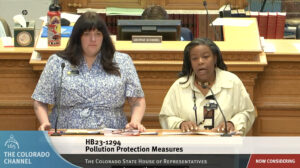Gov. Jared Polis late Tuesday signed a significantly pared-down bill seeking to reform air-quality permitting in the state, but not before giving guardrails to state agencies and an interim legislative committee on how he expects them to discuss further pollution-reduction measures.
The unusually prescriptive signing statement added by the Democratic governor after putting his John Hancock on House Bill 1294 came as a relief to leaders in the oil and gas industry and in the broader business community. While groups like the American Petroleum Institute and Colorado Oil & Gas Association would have preferred Polis veto the bill altogether, they said Wednesday that clarity he added to two upcoming processes should limit unrealistic burdens being placed onto the industry.
HB 1294, in its final form, creates an interim committee to study air-quality improvements, lets citizens submit evidence to state regulators of polluter violations and requires the Colorado Energy and Carbon Management Commission to finalize a definition of “cumulative impacts” by April. That definition will establish parameters for the former Colorado Oil and Gas Conservation Commission to discuss how proposed new wells add to pollution issues in an area when members consider whether to grant permits for drilling.
That’s a far cry from where the bill began.
A wide-ranging bill to reduce pollution
Initially, HB 1294, sponsored by Democratic Reps. Jennifer Bacon of Denver and Jenny Willford of Northglenn, required that projects that qualify as minor sources of pollutants undergo extensive modeling to be considered in permit requests. It also sought to require such modeling results to be combined with the cumulative pollution impacts of all similarly owned projects in a two-square-mile area, which particularly would have affected oil and gas wells.

Colorado state Reps. Jenny Willford and Jennifer Bacon speak on April 29 about their bill to improve Colorado’s air-quality permitting process.
The bill also sought to launch rulemaking on numerous proposals, including the limitation of single-occupancy-vehicle travel to large employment sites, the regulation of emissions from indirect sources like warehouses and shopping malls and the use of electric fracking equipment. And it would have required prompt investigation by the Colorado Department of Public Health and Environment of all citizen complaints despite staffing issues at the agency, plus offered citizens the ability to sue and appeal decisions to the Colorado Air Quality Control Commission.
Polis in his signing statement said that improving air quality is a top priority for his administration — a statement he may have felt compelled to reiterate after two of his agencies initially opposed HB 1294 — and laid out a litany of ways he’s sought to address the issue. Those include enacting new building codes and building-performance standards, adopting an advanced clean trucks plan, putting all Colorado utilities on a path to producing 80% renewable energy by 2030 and closing all the state’s coal plants by 2031.
But he also used the statement to offer clarity to the CECMC as it undertakes rulemaking to define “cumulative effects” and to offer advice to the soon-to-be-formed Legislative Interim Committee on Ozone Air Quality.
Polis’ pleas
To CECMC, he emphasized that the “addressable impacts” they should consider in defining cumulative impacts are those direct impacts from oil and gas locations rather than impacts from other sectors or other sites. Polis did clarify, however, that commissioners should consider the output of sources that are “controlled or owned by the operator,” saying that non-road engines contracted from third-party vendors should not be omitted from the analysis.
To legislators, he first pushed them to focus on sources of ozone from places such as power plants, the transportation sector or industrial areas rather than just those sources from oil-and-gas operations. And he asked committee members to consider how any potential changes to existing regulations could “place significant administrative burdens on already under-resourced and under-staffed state agencies” and address how they can help to attract and retain technical staff to implement new laws.
“While oil and gas is a contributor to Colorado’s air-quality challenges, I encourage the committee to focus on all sources of ozone,” Polis wrote. “A thorough conversation must recognize all sources of emissions and evaluate, streamline and improve the regulatory process for each.”
Industry and chamber reaction
While COGA President/CEO Dan Haley said he would rather have seen Polis nix an “unnecessary” bill that he believes will do nothing to lower emissions, he called the signing statement positive in two major ways. Polis’ directions narrow the definition of cumulative impacts to those impacts that can be controlled by an operator — rather than including, say, the impact of passing traffic or global climate change — and take a holistic approach to ozone-pollution reduction rather than pinning all responsibility on one industry.

Kalt Schwartz is director of American Petroleum Institute Colorado.
“It just focuses on what we can control,” added Kait Schwartz, director of API Colorado, on clarity around the definition of cumulative impacts particularly. “I think it narrows the scope … It makes it more constructive. It’s not about putting us out of business. It’s about trying to impact an air pollutant.”
Meghan Dollar, Colorado Chamber of Commerce senior vice president of governmental relations, voiced similar praise for the signing statement, saying that it furthered the efforts of the coalition that narrowed the scope of the bill substantially. Even after sponsors removed most permitting increases and ended the bill’s launch of rulemakings in myriad areas, the chamber and other groups fought to remove legal provisions that could have led to an increase in lawsuits stemming from complainants unhappy with the outcomes of CDPHE investigations.
“The Colorado Chamber is pleased to see the statement from Governor Polis regarding HB23-1294,” Dollar said. “We led a strong coalition voicing similar concerns as we succeeded in finding compromise on the bill.”
What comes next on pollution reduction
While Polis’ clarity to the CECMC is likely to carry substantial weight, it’s unknown how much influence his words will have on the interim legislative committee, particularly after Bacon and Willford expressed frustration with lack of action from his administration in cleaning up the air. The committee will not be allowed to introduce any bills as a legislative body, but its members still can introduce legislation on their own, and both sponsors have said they want to find ways to better protect the lower-income, too-often-polluted communities they represent.
Schwartz said she hopes the appointed members take Polis’ words to heart and look for solutions that go beyond oil and gas rigs and, thus, can have more impact on the state.
“I think there is always potential for something to go off the rails. But it was impactful that the governor asked to look at ozone as a whole,” she said. “They need to look at this as a big picture and take a step back and not turn this into another exercise in demonizing oil and gas.”
